#we stan michael myers murder family
Text
What do you mean Michael didn’t adopt Corey and they became a murder family with Allyson as his daughter-in-law?? Did you watch a different movie???
#hallowen#halloween ends#michael myers#corey cunningham#allyson strode#slashers#we stan michael myers murder family
319 notes
·
View notes
Text
Rob Zombie; "Why it's time to step outside the confinements of his own box."
For close to four decades,
Rob Zombie has brought nonstop psychedelic grooves and a rockstar presence while gracing his own music and the silver screen with gut-churning, drug-tripping visuals. He not only commands quite the presence in films (whether his own successes or others’), but also makes appearances within many other horror soundtracks. There’s no denying that Zombie is a bloodied savant who has stayed incredibly consistent.
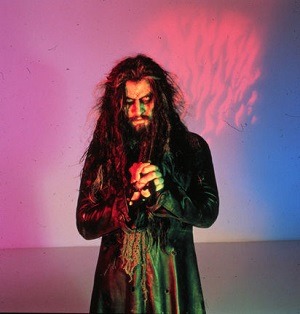
[ᴿᵒᵇ ᶻᵒᵐᵇᶦᵉ. ⁽ˢᵒᵘʳᶜᵉ: ᴳᵒᵒᵍˡᵉ ᴵᵐᵃᵍᵉˢ⁾]
(Written by Stella, edited by Jacob J.)
(Side note; tumblr’s photo formatting is a pain)
Let’s take a dive into his music before getting into his film library. From 1985-1997, White Zombie released six albums (between studio and compilations). La Sexorcisto: Devil Music Volume One didn’t break into the Billboard 200 chart until a year after its 1992 release. Shortly thereafter, it became the hot and groovy bong success of the band, going on to sell two million copies. Astro Creep 2000, their final and fourth studio release, was their first and only album to chart within the Top 10 of the Billboard 200 in 1995. Up to this day in 2020, “White Zombie” has been featured in 47 TV, film, and video game soundtracks, from Beavis & Butthead to Pen15 to Bride Of Chucky (which includes a personal favorite moment of mine), amongst many others.
After the disbandment and separation, Zombie continued on his solo journey. He has gone on to release six studio albums, with a seventh on the way in March 2021, titled The Lunar Injection Kool Aid Eclipse Conspiracy. A multitude of hits—eight to be exact—sat within the Top 10 of the Billboard 200 records.
══════════════════
Zombie’s extensive film career is a “Super Beast” on its own.
He has been very vocal about gaining inspiration from 1920s-1980s horror culture. In many interviews, he’s cited Stan Lee, Bella Lugosi, Alice Cooper, and Steven Speilberg as being responsible for molding the brain that we know today.
Some of his influences include:
George A. Romero’s Dawn of the Dead (1978)
A Clockwork Orange (1971)
Texas Chainsaw Massacre (1974)
The Cabinet of Dr. Caligari (1920)
The Shining (1980)
Zombie’s upbringing in the carnival industry alongside his family is another key influence.
[[I’ll only be focusing on Zombie’s live-action films here.]]
══════════════════
In 2000, Rob made his directorial and (very memorable) screen debut with House Of 1000 Corpses.
It took three years to be released because of quarrels with major production companies regarding the film’s majorly aggressive themes of torture, blood, violence, sex—not to mention his arrogance with MGM, fighting to get rights back from Universal. Eventually, Lionsgate bit the bullet, albeit with the major stipulation of having Rob edit it down much further so House could pass with a “tame” R rating.

[[House of 1000 Corpses: Rainn Wilson as taxidermy merman (Source: Tumblr—and if you’re brave, you can view the scene here.)]]
══════════════════
In 2005 and 2019, the franchise’s next two installments—Devil’s Rejects and 3 From Hell—were released. The franchise is heavily influenced by the shocking, sickening, and unforgettable ’70s classic Texas Chainsaw Massacre. It follows a family of psychotic, sadistic, and bloodthirsty (if I’m being honest) necrophiliacs. They kidnap, kill, torture and brutalize anyone who gets in their way. At the end of Devil’s Rejects, they somehow manage to survive a police shootout, escape prison, and waltz on into Mexico (as seen in the franchise finale 3 from Hell).
Look, it’s all complicated.
Main Characters from the franchise:
Captain Spaulding—Sid Haig
Baby Firefly—Sheri Moon Zombie
Otis B. Driftwood—Bill Moseley
Momma Firefly—Karen Black (recast as Leslie Easterbrook after Karen’s passing)
(Other notable appearances throughout: Chris Hardwick, Rainn Wilson, Danny Trejo, Dee Wallace, Ken Foree, and Diamond Dallas Page.)
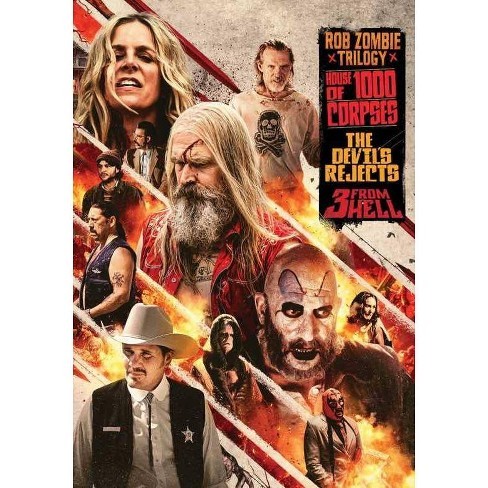
⁽“ʰᵒᵘˢᵉˢ ᵗʳⁱˡᵒᵍʸ”, ᵈᵛᵈ ˢᵉᵗ﹔ ˢᵒᵘʳᶜᵉ﹔ ᵗᵃʳᵍᵉᵗ.ᶜᵒᵐ⁾
══════════════════
The notorious/controversial Halloween (John Carpenter, 1978) remakes from 2007 and 2009.
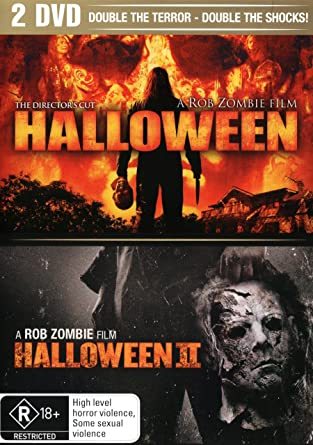
(ᵃ ᵛⁱᵉʷ ᵒᶠ ᵗʰᵉ ᵇᵒˣ ᵃʳᵗ ᶠᵒʳ ᵗʰᵉ ʰᵃˡˡᵒʷᵉᵉⁿ ʳᵉᵐᵃᵏᵉˢ ⁽ˢᵒᵘʳᶜᵉ﹕ ᵃᵐᵃᶻᵒⁿ⁾)
Look, this is a remake that you either adore or hate with a burning passion. If you’re a horror fanatic, you know what’s up with the original.
I personally adore Zombie’s take. The fact alone that he gave us an entire background story as to why Michael became the psychotic slasher that we’ve come to know and love. Plus, with an increased suspense and gore factor? Worked incredibly well and did justice (in my opinion).
The film made me feel bad for Michael, with moments of child Myers in therapy, particularly his love for making masks to pass the time while he was locked up and the touching family moments between him and his mother Deborah (Sheri Moon).
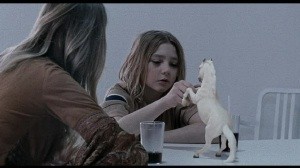
ᵈᵉᵇᵒʳᵃʰ ᵃⁿᵈ ᵐⁱᶜʰᵃᵉˡ ᵐᵉʸᵉʳˢ ⁱⁿ ʲᵃⁱˡ ᵗʰᵉʳᵃᵖʸ. ⁽ˢᶜʳᵉᵉⁿᶜᵃᵖ, ʰᵃˡˡᵒʷᵉᵉⁿ. ˢᵒᵘʳᶜᵉ﹕ ᵍᵒᵒᵍˡᵉ⁾
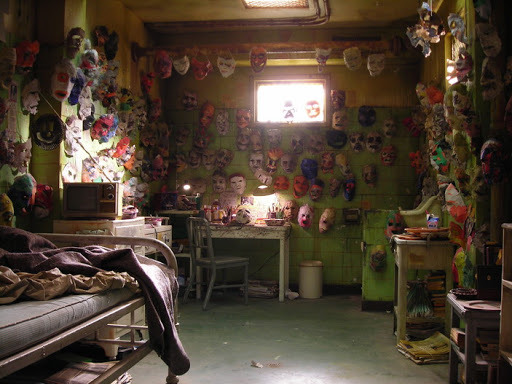
[Michael’s cell in the 2007 Halloween remake. (Source: Google)]
Add in the supporting cast of Michael McDowell (Loomis), Brad Douriff (Sheriff Leigh), Scout Taylor-Compton (Laurie Strode), etc., and I honestly think that it came together very well as a remake.
The films rated relatively low, but they did gross higher than the budgets that they originally had to film on. Again, I’m not going to give much attention to the higher-ups of critical perception—it all comes down to personal taste.
══════════════════
“Lords of Salem” (2013)
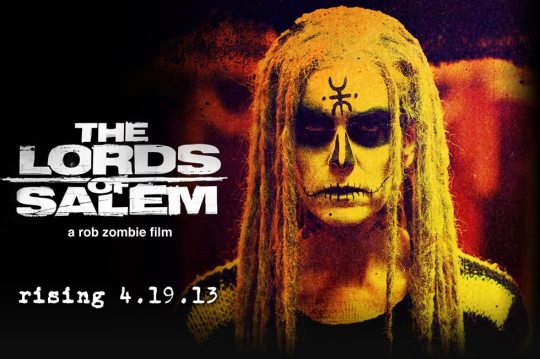
[[Promotional art for Lords of Salem. (Souce: Google Images)]]
A film that’s centered within Salem, Massachusetts,
this film—you guessed it—tackles witches, occultism, possession, Satan, and all the usual topics. Heidi (Sherri Moon) is a radio DJ who gets sent a mysterious record that’s labeled as being from “The Lords.” From then on out, shit gets a little dicey and admittedly, very disjointed. You can’t fault the cast here, and I loved the visuals that they were going for. However, with set schedule conflicts and multiple rewrites, which led to essentially running out of time to film? As a whole, what looked great on paper just couldn’t be done justice.
My FAVORITE sequence within the film (SPOILERS):
youtube
I can forgive the disjointedness solely because of how mind-boggling and brilliant the film’s history and proper visuals were. Also, we got to see Dee Wallace, Judy Geeson, and Patricia Quinn as creepy and badass witches who moonlight as Heidi’s landlords. Also Meg Foster who leads their coven? Can we talk about what a femme-fueled power cast that is?!
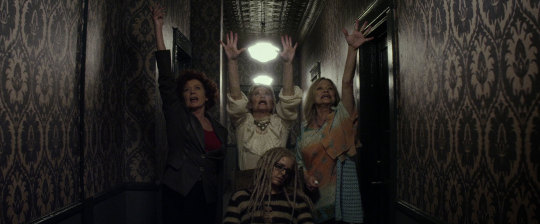
[[Left to right: Patricia Quinn as Megan, Dee Wallace as Sonny, and Judy Geeson as Lacy Doyle. (Screencap, Lords of Salem. Source: Google) ]]

[[Meg Foster as coven leader Margaret Morgan. (Screencap, Lords of Salem. Source; google)]]
Like I said prior, the film gets a little wild. If you’re...well, buzzed prior to watching, it may make a little more sense.
══════════════════
“31” (2016)
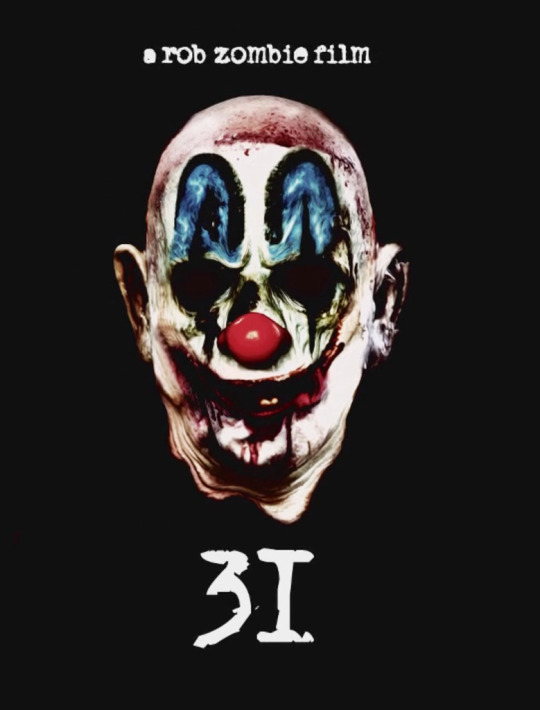
[[Film poster for 31 (Source: Google)]]
[Synopsis from IMDB; “Five carnival workers are kidnapped and held hostage in an abandoned, hellish compound where they are forced to participate in a violent game, the goal of which is to survive twelve hours against a gang of sadistic clowns.”]
Here, we clearly see that Zombie is invoking his childhood growing up within carnivals. In a 2013 interview with LA Weekly, Zombie divulged more about it:
“When we were kids, my parents would [work at the carnivals], and me and my brother would get dragged along to these things all the time and have to work.”
He went further on to say;
“Yeah, and it's not the nicest world. As a kid, you get exposed to the crazier underworld of the carnival. Me and my brother, when we were very little, we'd be inside the haunted house playing all day. So, already, what people are paying money to be scared [of], we're just playing in because it's fun. We saw the inner workings behind the machines.”
youtube
(”31″ trailer, source; Youtube)
Once again in this film, Zombie brings a powerhouse cast:
Jeff Daniel Phillips as Roscoe Pepper
Meg Foster as Venus Virgo
Malcom McDowell as Father Murder
Judy Geeson as Sister Dragon
Richard Brake as Doom Head
You can view the entire cast at IMDB here.
Set in 1976, Zombie stays true to his nods. Again, depending on taste, this is a huge hit or a wild miss with mindless homicidal violence, campiness, and climbs across the monkey bar of standards that we’re used to seeing from him.
══════════════════
So at this point, you’re probably wondering why I think that it’s time for Rob Zombie to step out of the confinements of his own box...
══════════════════
It’s no secret that Zombie sticks to only a small group of tropes:
Slashers, families or groups of homicidals that lack remorse, the occult, etc. There’s no shame in sticking to what you know. Hell, Zombie has seemingly cracked the code over the past two decades that he’s been in the film industry that so many directors still don’t seem to get.
IMO, despite whatever you personally feel about the films mentioned above- I feel like we’re living a freaky groundhog day repeat within Zombie’s filmography.
══════════════════
Now, if it ain’t broke, why fix it? Look, I’m not saying that Zombie has to change anything. However, I would love to see him tackle some other nuances that we’ve already seen from him in small doses.
- Children: We haven’t seen Zombie exactly take on what horror films depict kids as. Sure, he made a breakout and impeccable choice with young Michael Myers (Daeg Faerch) back in 2007. I personally would adore to see a reimagined (NOT remade) Children of the Corn on acid, one we all know Zombie can tackle and turn every existing view on its head.
- Witchcraft, The Occult, Satan, Voodoo: Zombie genuinely had a phenomenal concept (on paper) for 2012’s Lords of Salem. It was unfortunate that they ran out of resources and ran into unfortunate circumstances on set while filming.
The film wasn’t a total tank, though, given how inspiring and insane all the visuals were throughout the 1 hr, 41min film. I am absolutely positive that, given a full-force opportunity, Rob could rectify the mess that was out of his control. We completely saw that he provided visuals that left quite the impression, and he could take those taboo subjects by the goat horns.
- Animals (not the human form): It’s no secret that Rob and his wife Sherri are ethical vegetarians. It would be so tongue and cheek to see them take on such topics as animals getting their revenge, or even vegetarians torturing carnivores. This twist on the formula would make for an interesting viewing.
══════════════════
2.) In regard to time periods,
Zombie stays within—and pays homage to—the 1970s and 1980s quite a bit. Obviously, those are the eras that Zombie personally loves the most when it comes to filmmaking. However, it would be very interesting to see him take on current day settings.
Zombie has such a unique viewpoint. Given changing climates in politics, human decline/growth, the economy, etc., he would do work that could easily put Ryan Murphy to shame.
══════════════════
3.) He could also do with some different casting every now and then.
Let me preface this by saying that I adore every repeat casting choice that Zombie has made for his films.
Of course chemistry is a huge thing, and sticking to his friends is a very smart choice. However, he also has the potential to make new stars, boosting the power of those that may be under the radar. He can support those new stars with cameos from classic actors that we haven’t seen in awhile. I can’t begin to even fictionally cast those who fit the bill, but I do believe that with the “Zombie Touch,” he can bring so much more fresh air to the usual casting.
══════════════════
There’s no doubting what Rob Zombie is clearly very good at. Despite mixed reviews from the horror world and critics, it’s time that his fans open their eyes to new possibilities. Of course, there are die-hards, but digging your feet in further doesn’t allow the growth of horror and its ever evolving themes.
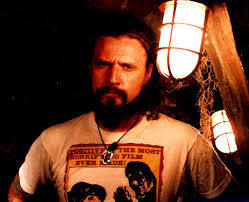
[[ʳᵒᵇ ᶻᵒᵐᵇⁱᵉ, ˢᵒᵘʳᶜᵉ﹔ ᵍᵒᵒᵍˡᵉ ⁱᵐᵃᵍᵉˢ]]
This theory has been on my mind for a very long time—since 3 from Hell came out. I’m sure, in his usual fashion, we won’t be seeing any new films from Rob anytime soon (what with his new album set to release in March 2021, not to mention the toll that the pandemic has had on Hollywood.)
Still, it never hurts to challenge the set standards and ways.
#rob zombie#zombie#sherri moon zombie#house of 1000 corpses#devils rejects#31#lords of salem#halloween#halloween remake#horror film#horror movies#horror films#retrospective#opinion#opinion piece#white zombie#torture#bloody#1970#1980#1970s#1980s horror#1970s horror#1970s aesthetic#1980s aesthetic#texas chainsaw massacre#michael myers#myers#clowns#scary clowns
5 notes
·
View notes
Text
BLOGTOBER 10/23 & 10/25/2018: HALLOWEEN (2007) & HALLOWEEN II (2009)
By the time Rob Zombie made the bold move of remaking John Carpenter’s name-making classic HALLOWEEN, the horror rock-star’s directorial career had already proved to be incredibly divisive. His 2003 film debut, HOUSE OF 1,000 CORPSES drew a cult from among diehard fans of his music, but was largely panned by critics who identified it as a ramshackle, self-indulgent disaster. The movie was little more than a Frankensteining-together of Zombie’s favorite things, but he managed to follow it up swiftly with 2005′s semi-sequel, THE DEVIL’S REJECTS. With this project, he appropriated three of the principle characters from his cartoony, ROCKY HORROR PICTURE SHOW-like first feature, and reimagined them as the redneck antiheroes of a story that plays like a cross between THE TEXAS CHAIN SAW MASSACRE and THE WILD BUNCH. While DEVIL’S REJECTS showed major improvements in terms of drive and focus, it still felt unsettled. It is an emotionally confused movie that has trouble deciding whether its tale is more tragic for the innocent victims of its psychopathic protagonists, or more triumphant, for the Rejects’ anti-establishment swagger and charisma. Rob Zombie displays a refined aesthetic sense, and seems sincere in his storytelling, but he didn’t have much time to let these things ferment into a more potent cinematic brew before he stepped up to bat again with his controversial remake of the beloved HALLOWEEN in 2007.
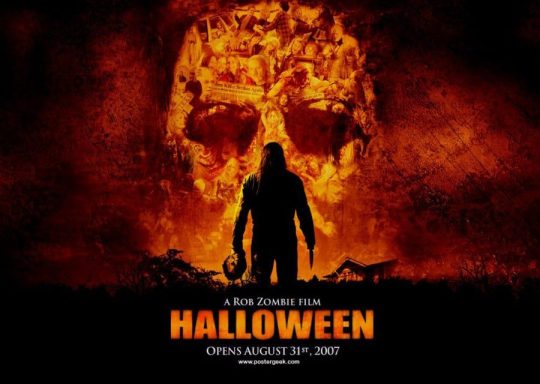
Reviled even by the likes of John Carpenter himself, Zombie’s dour, ponderous retelling of the archetypal slasher story was baffling to critics and genre buffs alike. Loaded up with clunky psychoanalysis that flies in the face of Carpenter’s original intention--Michael Myers is PURE NO-REASON EVIL, FULL STOP--this iteration of HALLOWEEN worked for few people besides Zombie’s hardcore stans. In spite of that very large and general problem, the writer-director was back again in 2009 with a sequel to his own remake. With HALLOWEEN II, he took two major creative risks: Bringing the ubiquitous Sheri Moon Zombie back even though her character died early in the first film, and centering the narrative on Laurie Strode’s psychological recovery, or lack thereof, from her original ordeal. It is easy to see how this setup would draw more complex and ambivalent responses. Mrs. Zombie’s appearance as the ghost of Myers’ mother, whose character is plagued by a lot of Jungian nonsense, was identified fairly as ludicrous by many viewers. On the other hand, Scout Taylor-Compton’s return as Laurie Strode takes a character who was little more than a cardboard cutout in the first film, and turns her into a convincing mass of trauma who undergoes a profound transformation over the course of this sequel. As with THE DEVIL’S REJECTS, HALLOWEEN II suggests that even while Rob Zombie can be an incredibly frustrating filmmaker, he still seems to be on to something. Even in my most stuck-up moments, when his smug use of slow motion and arias of unshocking cuss words make me want to forget everything I just watched, his movies nag at me in a way that I have a hard time describing. I’m just now starting to formulate an understanding of why.
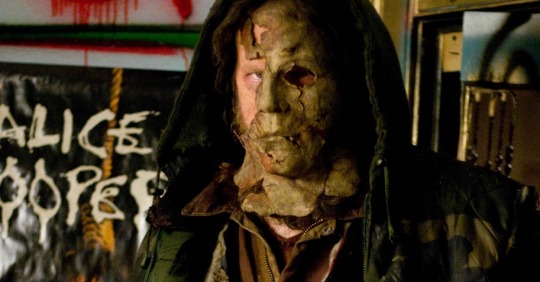
Often, I find myself asking: Who is Rob Zombie? First and foremost, he is a professional nerd. His music, art, videos, and feature films are strung together by his scholarship in all things genre, whether he’s invoking Tobe Hooper’s snuff-like realism, or the innocent sitcom pleasures of the Munsters. Zombie is vastly erudite about horror, and really anything remotely culty. This is actually to the detriment of HOUSE OF 1,000 CORPSES, which is so bloated with pop culture references that it almost chokes out the movie’s dubious originality. But while he has that irritating nerdy compulsion to competitively show off what he knows, he doesn’t seem like the kind of guy who buys and bags comics without even cracking them open. Rob Zombie is clearly, legitimately passionate; it’s heartwarming, and enough to make you want to root for him even when you don’t totally love what he’s doing. His craftsmanship is on point, too, as a multimedia artist whose talent has been abundantly evident since the early band flyer days. It comes as no surprise that he attended Parsons School of Design, and he occasionally shows his hand as an amateur film historian with a love for golden age Hollywood. So, whatever he wants you to think about his hellbilly stage presence, he’s clearly no hick, and no basement-dwelling dweeb either. He’s an educated artist with a background in New York City’s brainy ‘80s noise rock scene. It’s because of this that I find the worshipful attitude his films take toward their sociopathic murderers to be, well...kind of annoying. Why am I supposed to think it’s so cool, as the movies’ punk rock tone suggests, that the Firefly family tortures random bystanders to death for no apparent reason? Why doesn’t Rob Zombie know how tired the whole “scary clown” thing is, and has been for a long time already, even when it’s someone as magical as Sid Haig under the greasepaint? Why do I feel like Zombie’s interest in pimps and ho’s is deeper than just exploitation pastiche, which makes it potentially worse than if it were just a shallow affectation? The thought of this Massachusetts-born college boy fantasizing obsessively about being so crude and violent and salt-of-the-earth is kind of lame. So, instead of just, you know, being a hater as usual, I looked it up--and discovered that Rob Zombie’s roots are actually in the fairway. As Wikipedia aggregates from various interviews:
While raising their sons, Rob's parents worked in a carnival, but they chose to leave after a riot broke out and tents were set on fire. Zombie recalled the experience in an interview, stating, "Everybody's pulling out guns, and you could hear guns going off. I remember this one guy we knew, he was telling us where to go, and some guy just ran up to him and hit him in the face with a hammer – just busted his face wide open. My parents packed up real quick, and we took off."
Suddenly, it all started to make sense. Sure, the costumed popstar isn’t an undead cross between Jerry Lee Lewis and Charles Starkweather in real life, but he isn’t a complete poseur either. It isn’t immediately clear, from underneath his mountain of collectory movie references, that he is, more or less, writing what he knows. He isn’t just emulating his cultural heroes, he’s mythologizing his own childhood.
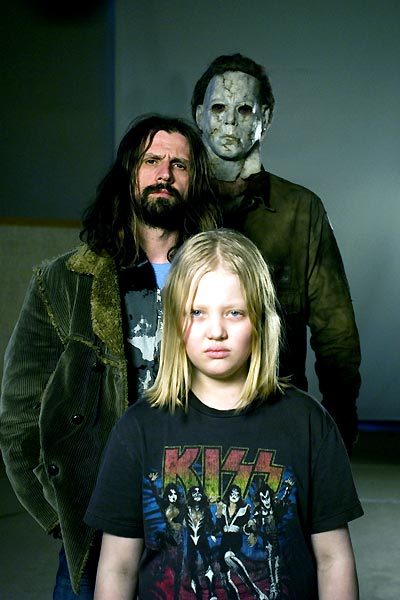
In view of this, the key to Rob Zombie’s movies is not an awareness of horror history and semiology; it’s actually all about outlaw culture. So, back to 2007′s deeply flawed HALLOWEEN. It’s a heavily bro-y movie, in its outsidery way, that breaks up the Dr. Loomis-Michael Myers-Laurie Strode love triangle, and focuses almost entirely on building a Myers biography. The fascinatingly sullen Daeg Neergaard Faerch plays young Michael, a fatherless boy on the verge of snapping from the relentless torment coming at him from all directions: his slutty sister, school bullies who fixate on his stripper mom (Sheri Moon Zombie), and his mother’s latest violent, depraved boyfriend. Michael follows the serial killer script perfectly, graduating rapidly from torturing animals to brutalizing other kids to annihilating his sister, her boyfriend, and his mother’s beau one Halloween night when his sibling chooses sex over taking her little brother trick-or-treating. He soon finds himself installed in a mental institution where he moves on to slaughtering the staff. Dr. Loomis (Malcolm McDowell) spends years evaluating the boy, though he is ultimately stymied by Michael’s profound lack of humanity. As Michael increasingly retreats behind the folksy homemade masks he spends all day crafting, the opportunistic Loomis gives up on him, instead committing his energy to a money-making true crime/pop psychology book about Myers. Flashing forward, we find the hulking adult Michael Myers (played by the 6′8″ wrestler Tyler Mane) getting ready to bust out of the asylum and wage war on his home town of Haddonfield. There we finally meet teen dream Laurie Strode, a spunky babysitter with a gaggle of gal pals who are perfect grist for the slasher mill. In the final leg of the film, Myers carves his way through Laurie’s social circle, in an apparent attempt to reunite with his sister: Laurie herself. Sheriff Brackett (Brad Dourif) reveals that when Michael’s despairing mother committed suicide years ago, he took her infant daughter and had her adopted out anonymously to insulate her from her family’s tragic history. Laurie, for her part, is unaware of anything other than her need to survive, which she only barely accomplishes.
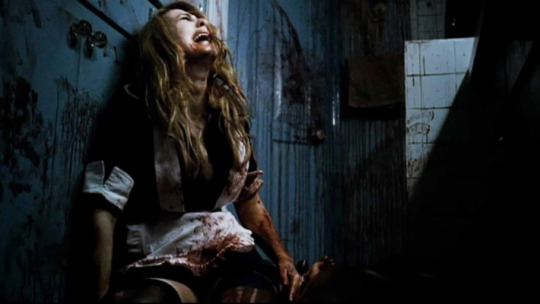
Naturally, Laurie’s story is the weakest part of a movie that is otherwise so focused on male experience. That is, the experience of needing a father, the ambivalent and ambiguous craving for maternal intimacy, the trauma of having your masculinity impugned by your (fag-obsessed) peers, and perhaps even the undermining influence of academia and capitalism on a man’s natural-born strength and worth. When the newly-freed Michael Myers storms through a truck stop to begin his pilgrimage to Haddonfield, and Rob Zombie chooses to accompany this scene with Rush’s regal outlaw anthem “Tom Sawyer”, it tells you everything you need to know about this take on HALLOWEEN. Like the rampaging Firefly family in DEVIL’S REJECTS, Michael is certainly evil, but he also represents something essential about the formation of and reinforcement of one’s individuality in the face of castrating societal norms--something the carnies among whom Rob Zombie grew up would have found very relatable.
It’s worth noting here that, while the sexuality of the women in Michael’s life plays a role in his distorted development, he is not reacting to their sexuality in and of itself. Michael Myers is not driven by the kind of covetousness that we associate with the archetypal slasher, who gives sexually frustrated male viewers a vicarious thrill by punishing sluts and teases. Michael’s problem is that his mother and sister’s sexuality contributes to his isolation. His classmates use his mother’s profession against him, and that profession keeps her from being able to tuck him in at night. Similarly, Michael doesn’t get to enjoy Halloween with his family and the other neighborhood kids, because his sister is too busy getting laid. Michael is abandoned, even while he still has a home to return to, an outsider even in his own house.
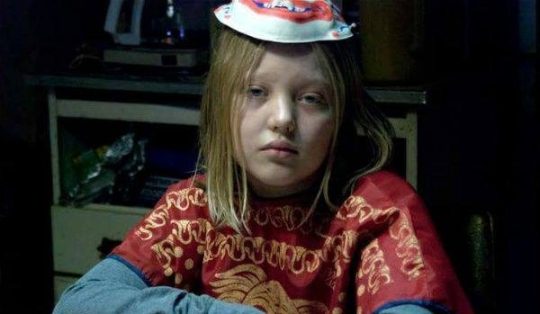
This leads me to an important point about why the portion of the movie that is devoted to Laurie's struggle is so ineffective. It is a flaw in the film, but a virtue of the director: Normal, attractive teenagers are not Rob Zombie’s people. He doesn’t even participate in traditional slasher movie misogyny, he’s so far away from thinking about them. His movies are full of badass women who are fully possessed of their sexuality, and who wield it like a weapon against hypocrites and assholes, and this is always shone in a heroic light. Moreover, he delights in casting women of all shapes and ages, often assigning them immense personal power, as in LORDS OF SALEM, an enormously satisfying movie about society’s original persecuted outcasts: witches. Rob Zombie is deeply committed to outsiders, and his definition of them isn’t limited to banal lawbreaking--he also rejects conventional beauty and our cultural obsession with youth. His films are populated by all manner of human beings, and the farther away they are from looking like model material, the more likely it is that they’re meant to be the heroes. On that note, whatever you think of his movies, you have to acknowledge that they are almost never dehumanizing. Zombie is an accomplished actor’s director who gets a full spectrum of emotion out of his performers, and who excels at creating a feeling of camaraderie within his ensemble casts. It is this surprising sweetness, and compassion even for the victims of the villains he lionizes, that makes HALLOWEEN II so peculiarly effective.
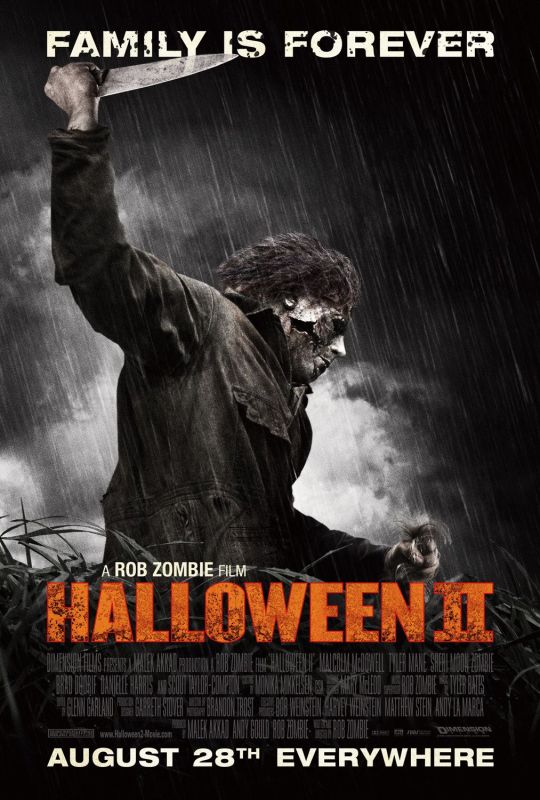
If 2007′s HALLOWEEN was a remake on which Rob Zombie couldn’t resist draping some of his personal hangups, HALLOWEEN II is almost a completely original and separate entity from what one thinks of as the franchise started by John Carpenter. In it, Michael Myers is presumed dead but his body is missing--and indeed, his character is missing for much of the movie. We find a disturbed, scarred-up Laurie Strode living with her surviving friend Annie, and Annie’s father, Sheriff Bracket. Laurie is dealing, poorly, with a heavy dose of PTSD. Along with nightmares and flashbacks, she also has trouble just being nice to people, or accepting affection. Annie and her father’s attempts to be charitable with their adoptive family member are no match for Laurie’s increasing surliness and mistrust of the world. Once a good-natured and optimistic young woman, her appearance becomes vagrant-like (curiously similar to Rob Zombie’s own casual look), her attitude is more and more nihilistic, and she develops a drinking problem. I’ve always wanted to see a movie with a slasher-like narrative foundation, but that focuses on aftermath and recovery, and recent gimmicky efforts like FINAL GIRL and LAST GIRL STANDING did absolutely nothing for me. HALLOWEEN II--at least, the superbly-acted Strode part of it--is the movie I’ve been asking for.
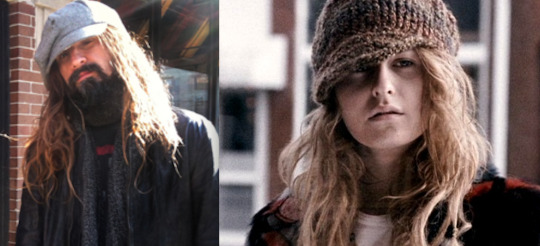
The other part of the movie is also interesting--or more specifically, it’s as ballsy as it is flawed. The movie gets off on kind of a bad foot when a title card quotes an obscure psychology text book called The Subconscious Psychosis of Dreams:
WHITE HORSE - instinct, purity, and the drive of the physical body to release powerful and emotional forces, like rage with ensuing chaos and destruction.
This is the excuse we have for the fact that the ghost of Deborah Myers arrives with a white horse to compel her son to find his sister Laurie Strode, aka Angel Myers, to reunite their family, presumably in the afterlife. Deborah Myers is kind of a spectral cross between Glenda the Good Witch and the Wicked Witch of the West, at once welcoming and sinister, drifting in and out of Michael’s consciousness in the company of a sort of ghost of his childhood (Chase White Vaneck, who is no Daeg Faerch honestly). It might be easy to dismiss this anomaly as an expression of Michael’s mental illness, and his desire to experience an idealized version of his youth in which his mother still looks after him--except that later in the movie, during the final standoff, Laurie is shown to be physically affected by these spirits. Maybe the implication is that she and Michael suffer the same psychological ailments, but for them to share such specific hallucinations without speaking is borderline supernatural in and of itself. So, while Sheri Moon Zombie does her best with her impressive force of personality and compelling physical presence, it’s hard to say what this part of the movie serves. When I first saw the film, I was completely outraged by this, not only because it made no sense to me, but because it felt like a cheap ripoff of Sarah Palmer’s similar prophetic visions of a white horse in Twin Peaks. That was all I managed to make of it.
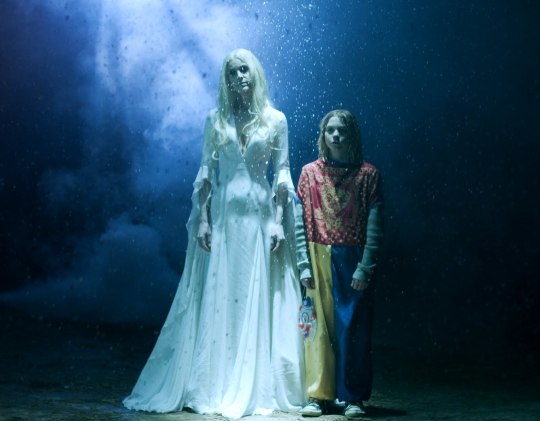
Today, I still don’t love it, but I have more trouble faulting Rob Zombie for trying to make HALLOWEEN his own, something more than a remake. He also does this by truly letting go of the Shape. The famous William Shatner mask was blown in half by Laurie at the end of the 2007 HALLOWEEN, and scarcely makes much of an appearance in this movie. Michael Myers is a disheveled drifter, literally haunted by his past, whose only real aim is to find a place to belong. It’s sort of funny, in retrospect: When John Carpenter made the first HALLOWEEN, he-by-way-of-Dr. Loomis declared Michael an empty shell of a person, someone who was simply born evil, as reflected by the empty-eyed mask he wears. For some reason, though, a whole legacy of directors just couldn’t resist trying to explain Myers away. The original HALLOWEEN II then says, “Well...what if Michael Myers is on a rampage because LAURIE STRODE IS HIS SISTER? What’s that you say? Why is that a reason to rampage? Ummmm...” And then HALLOWEEN 4 sees him pursuing other young female relations of his, and then in subsequent movies there’s an accursed rune, and druids, and immortality rites, and by the time you get to HALLOWEEN 6 you have this absurd stone soup of bad ideas. It’s a miracle that this franchise became such a thing. Rob Zombie makes the same fundamental mistake, but at least he tries it in the simplest possible way, asserting plainly that Nurture, not Nature, made Michael into a killer. Now, terminally lonely, he’s like a clown waking up in his trailer to find that the carnival left without him. Exiled from mainstream society, he seeks out what remains of his family, who, due to his own violent actions, has grown up more like him than he may have imagined.
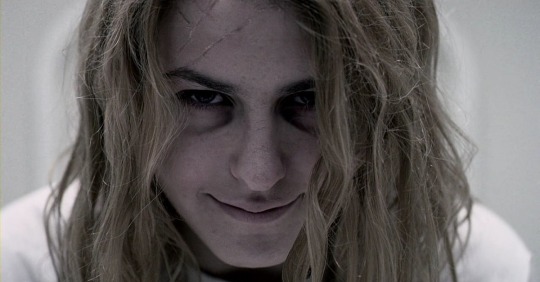
I’m not saying I think this was the best thing to do with HALLOWEEN 2. Personally, what I crave in horror movies is something that is farther beyond explanation than this--something that gesturally resembles my life experience, but that plunges past the veil of mundanity into a deeper, darker world of primordial fears and urges, addressing things that unsettle me because I cannot rationalize them. For me, horror is definitionally incomprehensible, and Rob Zombie’s HALLOWEEN diptych is fundamentally sane. But, I think what I’ve discovered is that these movies are not proper horror movies, in spite of their relentless sadistic violence. They are outlaw fables, with more DNA in common with something like EASY RIDER, than with FRIDAY THE 13TH. It’s funny to watch myself coming to a compassionate understanding of these movies that are themselves about outsiders and rejects who are specifically deprived of understanding. My goal in all this was not so much to convince people of the value of these movies, which one might reject on any number of reasonable counts, but to explain to myself why I keep coming back to them. It isn’t to condescendingly heckle them, and it isn’t just because they’re often handsome-looking, or because they’re so emotionally authentic even when the narrative is less than compelling. It must be because, even when I’ve found him challenging, I can’t help seeing Rob Zombie as a person with vision, someone who heroically eschews common consensus on taste and sense-making--the consensus even among horror fans and his own cinematic heroes--in order to say what makes sense to him personally. Finally, he has begun to make sense to me, too.
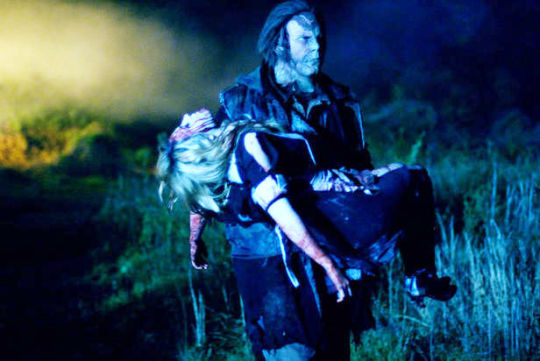
#rob zombie#halloween#2007#halloween ii#2009#blogtober#remake#John Carpenter#sheri moon zombie#michael myers#laurie strode#scout taylor-compton#brad dourif#malcolm mcdowell#tyler mane#the shape#horror#slasher#outlaw culture
147 notes
·
View notes
Text
Concept I highly doubt writing but it would be cool:
Platonic! Michael Myers x Reader x Corey Cunningham where Michael is Corey’s mentor and he brings another kid who wants to learn under his wing. Basically this:
Corey: Hey dad this is Y/N, they want to be a killer too and now they’re my sibling :)
Y/N: Hi :D
Michael: -DJ Khaled voice- Another one?
#hallowen#halloween 1978#halloween ends#michael myers#corey cunningham#michael myers x reader#corey cunningham x reader#platonic michael myers x reader#platonic corey cunningham x reader#we stan michael myers murder family#slashers x reader#platonic slashers x reader
184 notes
·
View notes